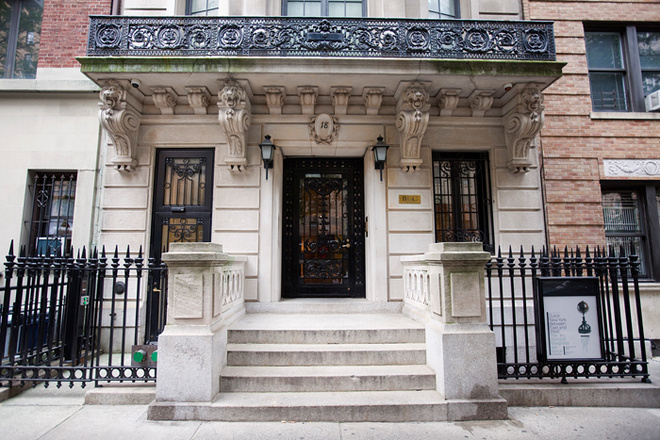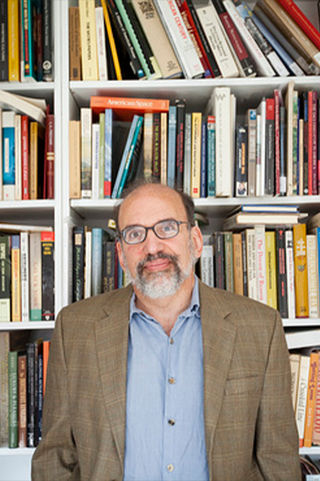New York, January 20, 2017—David Jaffee, professor and head
of New Media Research at Bard Graduate Center, died peacefully on January 20,
2017. He was 62 years old.
David Jaffee received his BA in History and Literature from
Harvard University in 1976. He spent a year at Christ’s College Cambridge
University and returned to Harvard for his doctoral work, writing a
dissertation on the cultural geography of Early America under the supervision
of Professor Bernard Bailyn. This was later published by Cornell University
Press as People of the Wachusett: Greater New England in History and Memory,
1630–1860. Blending social and cultural history, it was described by the
Journal of American History as “an ambitious book [which] provides a social
history of town creation and development and briefer forays into cultural
identity as explored by residents” and by the Journal of the Early Republic as
“an important book whose central conception of serial town settlement as the
engine of cultural production in greater New England makes a valuable
contribution to New England studies.” He was a historian at the National Museum
of American History, Smithsonian Institution, and taught at Georgetown
University and Princeton University before being hired as an assistant professor
at City College in 1987. He taught there, and at the CUNY Graduate Center,
until 2007. At the Graduate Center he taught courses on the literature of US
history, material worlds, visual and material culture of the US, the market
revolution, and the challenge of new media in history. As one of the chief
scholars in the CUNY system working on history, material culture, and new
media, he worked closely with Joshua Brown and the American Social History
project (on whose Advisory Board he sat), Stephen Brier and the CUNY program in
Interactive Technology and Pedagogy, and Kevin Murphy with whom he taught
graduate seminars. He was also a Fulbright Professor in American Studies at the
University of Tokyo.
Jaffee came to Bard Graduate Center in 2007. “David was the
central figure in two of the major curricular initiatives of the past ten
years—not coincidentally, the years he was at the BGC—the digital media lab and
the material culture of New York City,” said Dean Peter N. Miller. “Without
him, these would never have taken off as they have.” He was especially
instrumental in forming policy and curricular direction for the new Digital
Media Lab, which opened in fall 2009 and in hiring its first director, Kimon
Keramidas. At Bard Graduate Center, his courses included The Material Culture
of New York City, The 1853 New York Crystal Palace, Commerce and Culture in the
Modern City, and Reading the American Landscape. Several of his courses were
co-taught, including Interpretation of the Artifact in the Age of New Media with
Kimon Keramidas, Objects of Colonial Encounter with Aaron Glass, and American
Consumer Culture with Catherine Whalen. His book The New Nation of Goods:
Artisans, Consumers, and Commodities in Early America, 1790–1860 was published
by University of Pennsylvania Press in 2010 and won the Fred Kniffen Book Prize
of the Pioneer America Society. Jaffee was the visual editor of Who Built
America? Working People and the Nation’s Economy, Politics, Culture, and
Society. During his years at Bard Graduate Center he formulated the plan for an
NEH Summer Institute for College Teachers on American Material Culture using
New York City as the case study. This innovative project was selected four
times in four applications by the NEH and Jaffee served as its project director,
collaborating with Catherine Whalen as well as with K.C. Grier
(Winterthur-University of Delaware) and Bernard L. Herman (University of North
Carolina-Chapel Hill). At the same time, he began to see the convergence
between digital and exhibition research. He explored nineteenth-century New
York material culture in two Focus Projects at Bard Graduate Center:
Visualizing 19th Century New York (spring 2014) and New York Crystal Palace
1853 (spring 2017).
Associate Professor Catherine Whalen, his fellow Americanist,
explained that “David’s outstanding scholarship ranged widely and deeply, from
fine-grained intercultural histories of colonial New England to innovative
analyses of nineteenth-century makers, distributors, and users of consumer
goods.” She emphasized “his dedication to making American social history and
visual and material culture available across new media platforms” including
digital and exhibition spaces. “Above all,” said Chair of Academic Programs,
Professor Andrew Morrall, “David will be remembered for his deep commitment to
his students, his pleasure, as a leading historian of American material
culture, in sharing his store of accumulated knowledge, and his principled
sense of fair-mindedness and unstinting generosity of spirit.”












